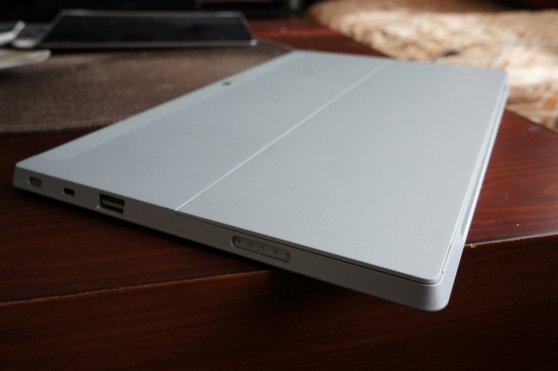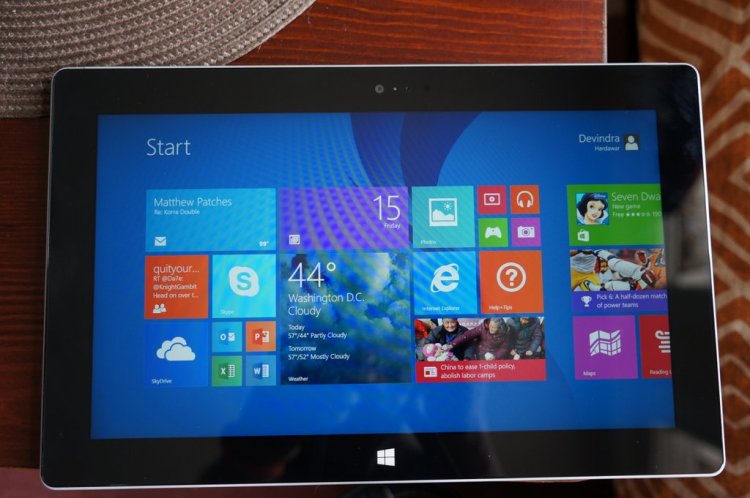The bad: App ecosystem issues remain
More so than a standard Windows 8 laptop, the Surface 2 relies on Microsoft’s new crop of Windows 8 apps. And for many, that alone could be a deal-breaker.
Even though the number of apps has risen dramatically over the past year (from 8,000 at launch to more than 120,000 last month), and Microsoft is also working on filling in the gaps with popular apps, Windows 8 lacks any knockouts to prove that the OS is actually a viable tablet platform. And many of the apps that are there aren’t nearly as useful as those on Android or iOS. The official Windows 8 Twitter app, for example, is fairly basic and doesn’t lend itself to multitasking. It just feels like a big-screen Twitter feed.
If you’re the sort of person who mainly browses the web and needs a few Office apps, this may not bother you at first. But it’ll definitely come into play if you ever want to do more with your Surface.
Is the Surface 2 enough to save the Surface line?
It’s no surprise that most manufacturers have given up on developing their own Windows RT devices at this point. It’s better for them to wait until Windows 8 apps fully mature. (Nokia, ever the trooper, is sticking with Windows RT with its new Lumia 2520 tablet — but then, most of Nokia is about to be acquired by Microsoft, so that’s probably prudent.) And as hardware gets cheaper and faster, there’s a chance that there won’t be much of a need for Windows RT down the line.
The Surface Pro 2, for example, is only a half-pound heavier than the Surface 2, but it’s significantly faster and sports the full version of Windows 8, so it can actually run your existing Windows applications. It’s a full-fledged computer, and not just a productivity tablet. But of course, it’s also twice the price of the Surface 2 right now at $899 and has a shorter battery life (by a few hours). Still, it’s not hard to imagine the gulf between those two devices being erased over time.
The biggest difference between the Surface 2 and Surface Pro 2 right now are the two chip architectures they’re based on: The Surface 2 runs an ARM-based processor, which is power efficient and built with mobile devices in mind, but doesn’t run old Windows apps. The Surface Pro 2 runs an x86-based processor, which is what Windows built its legacy on, but eats up much more battery life than ARM processors.
With every new Surface model, Microsoft is inching toward the ideal computer of the future – one that’s an easy to use tablet on the couch as well as a productivity workhorse in the office. But the company’s own branding is also making it difficult for consumers to understand what exactly it’s offering with the Surface line.
Who else but tech geeks will realize the limitations of the Surface 2 (no older Windows software for you!) before buying it? And the fact that the traditional desktop is still there for running Office and Internet Explorer makes things all the more confusing.

The verdict: An improvement in every way
Last year, it was clear Microsoft was hedging its bets on two visions of the future of computing: a cheaper hybrid with a low-power CPU, and a more expensive one with a traditional Intel chip. Today, it still seems like Microsoft is waiting to see which Surface vision is ideal.
But at least this time around the low-end Surface doesn’t just feel like an ill-conceived afterthought.
The Surface 2 proves that all of Microsoft’s latest moves aren’t completely crazy. It shows that there’s a need for a touch-enabled operating system and multifunctional hybrid computers. And even if the apps aren’t there yet, it’s still plenty capable on its own.
At the same time, it’s not a device that I would unabashedly recommend to anyone. But for those of you dreaming of an ideal productivity tablet, it’s functional enough to be useful without wanting to throw it out the window like the first Surface.
For Microsoft, that’s progress.


